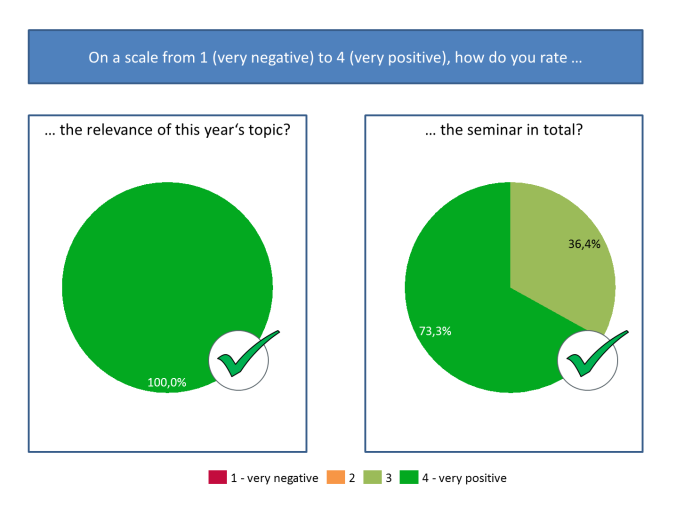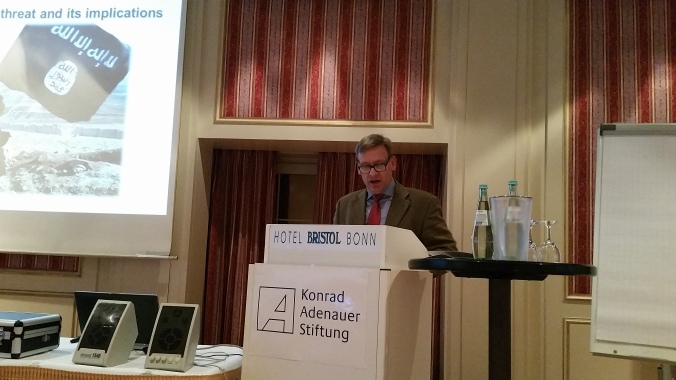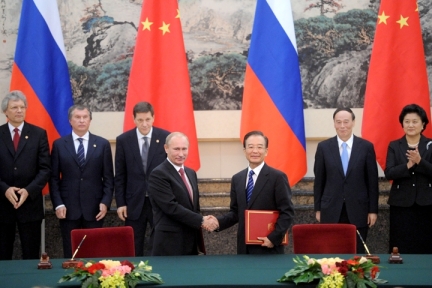After Action Report
by Philippe Welti, Former Swiss Ambassador to Iran
The seminar program offered first a series of lectures on various topics regarding the phenomenon of the “Islamic State in Iraq and Syria – I.S.I.S.” (or IS). Then, participants were invited in four workshops to elaborate options of how to understand “I.S.” and how to deal with it. Finally, the seminar concluded its program with a general discussion on a summary of the lectures and the workshops.
IS is the organisation in Iraq that has supplanted the Sunni opposition against the Shia-run government of the State of Iraq. The IS has, then, infiltrated Syria, where the initial popular uprising against the autocratic rule of Basher al-Assad and the Alawite minority started during the so-called Arab Spring. The IS has declared under its leader Al-Baghdadi to be the Caliphate.
The term Caliphate standing for the united/unique political and religious leadership of the Muslims of the first generation after Mohammed the Prophet, goes back to the 7th century CE. The history of the Caliphate as a principle and as a political system has been terminated with the last Sultan in Constantinople 100 years ago during the demise of the Ottoman Empire. With the declaration of a Caliphate in Iraq, the IS claims continuity over centuries of Islamic history.
Historical Introduction
The Conference started with a historical introduction by Aymenn Jawad Al-Tamini. In 2004, after the second Gulf war and the extermination of the Saddam Hussein regime, Iraq saw the appearance of a sort of Al-Qaida wing under the leadership of Zarqawi. Since 2006, the project of a Caliphate can be traced in conceptual documents of insurgent groups. Internal fighting for leadership and for the right strategy leads to Abu Bakr Al-Baghdadi as new leader in 2011. Since then he commands the IS.

Courtesy of Leo Harskamp (2016)
He is in command of the armed rebellion against the Shiite-dominated State authorities in Iraq. At the same time, in 2011, the ‘Arab Spring’ reaches Syria and triggers a country-wide rebellion against the Alawite leader Basher al-Assad, which leads to the current civil war. The most devastating price of the civil war between a disunited opposition and the regime in Syria is the infiltration of foreign fighters without any national Syrian legitimacy.
The predominant organisational structure of foreign fighters in Syria is the IS. Syria is a major expansion of IS out of its initial cradle in Iraq. Their presence illustrates the break-down of State structures and State legitimacy, the major cause of disaster for human society. In Iraq, IS has taken over the Sunni rebellion against the formally legitimate government in Baghdad and with it, former officers of the old Saddam army, who had developed hatred and rejection of the government out of frustration for having been excluded from State structures and political participation. So, in Iraq IS leads a sort of legitimate rebellion against an unfair regime.
In Syria, they intervene in a chaotic battlefield and realise, thus, probably for a short historic moment only, the idea and dream of a transnational Umma, a Muslim community across and beyond national borders. Then follow successes and lately a few set-backs in the expansion of IS.
Ideologically, IS is based on Salafi jihadi thought, which is the religious answer to the deep-rooted frustration of Muslims all over the world for having been left behind by the development of the world and for being unable to catch up with modern civilisation. Theologically, Salafi jihad is close to Saudi Wahhabism and anti-Shia. Beside specific causes for the rise of IS, the major cause is the general break-down of State structures and State authority in Iraq and in Syria.
Cultural and sociological aspects
Then, Huib Wursten, on cultural and sociological aspects, takes the seminar audience to the subtleties of the cultural dimension of religion. A more general understanding of religion as part of a cultural identity opens eyes for the pretended religious revolution carried by IS. His statement is: it’s not about religion, it’s all about culture. A clash of societies based upon collectivism (Arab/Muslim) with societies based upon individualism (western world).

Courtesy of Leo Harskamp (2016)
Legal Aspects involved for NATO
Another eye-opener comes from Juliette Bird on legal aspects, it is on the complexities of law behind the fight of civilisation against terrorism. Use of force deployed by States derives its legitimacy from the UN Charter, Chapter VII, from NATO Article 5 and from EU provisions dealing with military interventions.
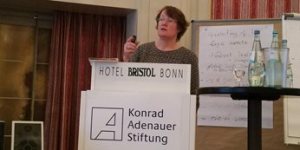
Courtesy of Leo Harskamp (2016)
The most important conclusion in Juliette Bird’s presentation is the assertion that in a world where more and more non-State actors are engaged in warfare, the status of non-State actor as opposed to the sovereign State has become irrelevant. This would make military operations against IS legally easier. For NATO members it means: Legally, NATO can act militarily.
Future of Alliance Turkey, US and EU Relations, Kurdish Issue
Then, Saban Kardas exposes Turkey’s position within the Alliance and vis-à-vis the conflict area. Turkey is unable to address autonomously the regional crisis and is heavily dependent on the Alliance. Turkey is threatened a) by the flow of refugees coming from Syria and Iraq and b) the Kurdish PKK operating out of Iraq and now also out of Syria, where they found a safe haven; c) IS has declared war on Turkey.

Courtesy of Leo Harskamp (2016)
For these reasons, Turkey carries out air strikes and artillery fire against IS and PKK in Iraq and Syria. For hosting refugees, Turkey will depend on a massive support from outside. Therefore, in cooperation with the international community various institutions and organisations have been erected to encounter this Foreign Terrorist Fighters (FTF’s). For encountering IS it is the Anti ISIL-coalition, Global Counter Terrorism Forum and cooperation with the United Nations Counter Terrorism Committee. The goal of these institutions in general is preventing inter-state travel of FTF’s, imposing law enforcement, countering incitement to terrorism (incl. internet), and revealing, and stopping, sources for financing FTF’s and their networks.
IS military & tactical perspective
Speaking of warfare in the region where IS is operating, a deeper understanding of the military perspective and in particular of the phenomenon of Proxy War is required. Andrew Mumford provided the necessary detailed insight into that phenomenon.

Courtesy of Leo Harskamp (2016)
Most recent factors for the rise of proxy warfare are (a) the ‘Arab Spring’, which brought successful regime change such as Libya and unsuccessful attempts to regime change elsewhere, (b) the rise of IS. Proxy warfare spares State actors to engage in costly and risky classical battles and allows States to better engage against non-state actors. Proxy warfare is flexible in dispensing and stopping military training for rebels and in providing and refusing again arms to third parties. But it is also risky, because proxy actors are unreliable, can change alliances and can change the structure and composition of whole coalitions.
The tool of proxy warfare has played in favour of IS when it received US arms originally dispatched to Qatar for fighting Qaddafi or when it was financially privileged by the Saudi intelligence chief Bandar bin Sultan. But when Bandar was removed from his position, IS lost this source.
Proxies can also turn against IS. Syria’s Assad, representing a State, is being used against IS as proxy of the anti-IS alliance in 2016, after having been the target of proxy war himself in 2011. Among the potential consequences of proxy war against IS is the unpredictable prolongation of violence, which intensifies the humanitarian disaster.
The particular role of religion in IS
A completely different picture of the conflict surrounding the IS, and a pessimistic analysis, was brought to the seminar by Hussein Solomon on the role of religion.

Courtesy of Leo Harskamp (2016)
His wider picture of political Islam over the last 300 years communicated the sobering recognition that, in principle, the Non-Muslim world is confronted with an Islam that is not willing and ideologically not able to compromise on its eschatological bet on Armageddon, that is the ultimate battle between the Good and the Evil at the end of time, which is expected soon. Everything that an amazed world society sees as un-explainable atrocities against mankind is, for IS, or at least for their ideologues, nothing else than divine preparation for Armageddon. And for them it is set to take place in Syria. The general message of Professor Solomon is: there is no hope.
IS economical & financial aspects
Some hope is brought to the seminar by Fabio Mini. On economic and financial aspects, and without underestimating the potential of IS, he nevertheless identified as its weakness the sustainability of IS as a State-like concept.
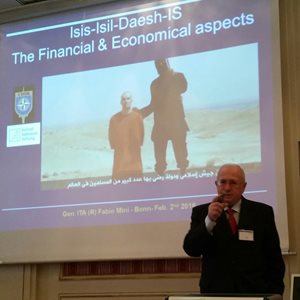
Courtesy of Leo Harskamp (2016)
So, there is hope. In fact, what Mini states, is: IS is economically and financially not sustainable. The history of Muslim frustration, the analysis of their religious and ideological background, the pictures carried by the media, all is depressingly scaring, but it is not sustainable, providing the strategic environment does the right thing.
Workshops
The Conference, then, dealt in four workshops with I.S. and its relevance for Europe and the Alliance.
Workshop 1 looked at military options and concluded that geographic containment through military means restricting IS on land and sea and in the air would degrade IS’s operational capability, space and prestige, but would require large-scale joint forces operations.
Workshop 2 looked at refugees and Europe’s security. Participants recognised the need for a common centralised management of the flow of refugees for addressing the humanitarian crisis and the security consequences. The establishment of a major reception camp in the first arrival country, i.e. Turkey, seems inevitable, but could not be implemented without large-scale support to Turkey also including political concessions.
Workshop 3 dealt with Russia and Putin’s assumed intentions in Syria and the region. Based on Kiran Jaeger’s list of Putin’s intentions and Russia’s interests, participants recognised that Putin and Russia are driven, in their Syria engagement, by genuinely strategic motivations: the protection of the Russian navy port on the Syrian Mediterranean coast and the quest for respect by other powers of the region (US, UK, Turkey, France, Iran) including Arab governments of the region (Syria, Iraq, Gulf States). Russia , by joining forces with Iran in Syria is seeking influence and ultimately dominance in the region.
Workshop 4, on religion, asked whether, after all, it is possible to deal with religiously motivated warfare, i.e. to fight against the idea of a violent ideology. Such a fight would require the promotion of our own core values and their benefits for individuals and society, also by focussing on common and shared values and also by using modern technology (social media). Ultimately, we would have to improve the prospects of the masses of the poor by elevating their intellectual capacities and their living standards.
 The 2019 CIOR Seminar will take place from 27 until 29 Januar 2019 in Bonn, Germany.
The 2019 CIOR Seminar will take place from 27 until 29 Januar 2019 in Bonn, Germany.